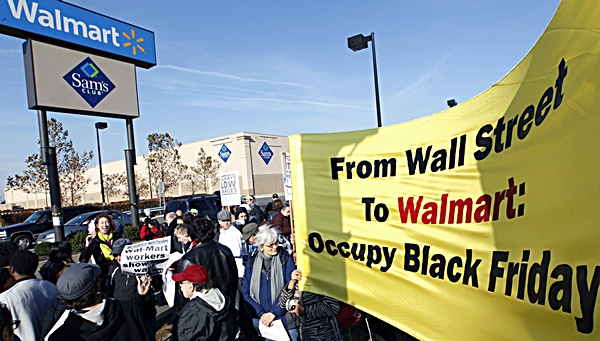NLRB complains Black Friday protesters went too far

THAT WAS THEN: Hundreds of protesters launched a nationwide Black Friday blitz against Walmart in 2013.
By Eric Boehm | Watchdog.org
Labor union members and protesters who stormed a Michigan Walmart on “Black Friday” in 2012 have landed in hot water with the National Labor Relations Board.
The NLRB has filed a complaint against Our Walmart, a so-called “workers center” group that organizes protests and claims to represent employees at the national big-box retailer, and the United Food and Commercial Workers labor union, which funds Our Walmart’s activities. The complaint also names a number of individuals, including UFCW employees and members of Occupy Detroit, who participated in protests at a Walmart in Dearborn, Mich., in November.
STORMING THE STORE: A video posted to the Occupy Detroit YouTube page shows protesters streaming into the WalMart store in Dearborn, Mich., on Black Friday 2012. That event is now the subject of an NLRB inquiry.
The Black Friday protests have become a common sight at Walmarts and other large retailers, but the labor unions behind the protests stepped up their efforts in 2013 to coincide with a national push from progressives seeking to hike the minimum wage.
The protesters in Dearborn apparently stepped it up a little too much.
According to the NLRB, “approximately 50 to 80” individuals stormed the electronics section of the Walmart and remained there for up to 20 minutes. While that was happening, seven women and one man entered the women’s restroom and “coercively interrogated an employee regarding her wages, hours and working conditions.”
Occupy Detroit posted a video of the protest on their YouTube page, showing the planning and execution of the protest.
The dozens of protesters who set up shop in the store’s electronics department are shown chanting, signing and reading scripted lines from sheets of paper. None of them appear to be Walmart employees.
Those disruptive activities violate the National Labor Relations Act, according to the NLRB. Labor unions are not allowed to interfere with business during protests or strikes, under federal labor laws.
The NLRB complaint orders the two organizations to cease and desist from “restraining and coercing employees” during protests.
The labor union and Our Walmart have until Monday to respond to the complaint.
Unions such as the UFCW and workers centers such as Our Walmart have a mutually beneficial relationship. Since the workers’ centers are registered as nonprofits, they are allowed to engage in activities that would be off-limits for labor unions constrained by federal labor laws.

STAND UP, LIVE BETTER: Protesters who set up shop inside the Walmart’s electronics section may have violated federal labor laws.
As Bill McMorris of the Washington Free Beacon notes: “Federal labor law bars unions from interfering in business operations directly during strikes and protests, but those tactics have been common in Walmart and fast food protests in recent months. Protesters have gone largely unpunished by relying on non-profit worker centers to sponsors the rallies. Nonprofit groups are not subject to the laws that limit unions, despite the millions of dollars that worker centers receive from Big Labor groups like the UFCW and SEIU.”
And the workers’ centers have made a name for themselves by doing just that.
Watchdog.org has reported on the disruptive “Occupy Wall Street tactics” used by groups like the Restaurant Opportunity Center, or ROC, a worker center with ties to several unions.
Richard Trumka, president of the AFL-CIO, has identified workers centers as the future of the American labor movement.
In addition to targeting big-box stores such as Walmart, unions are funding groups behind protests at fast food restaurants across the country.
Fred Wszolek, spokesman for the Workforce Fairness Institute, told McMorris the NLRB complaint could be a sign of trouble on the horizon for labor unions and their workers’ center allies.
“The UFCW cannot afford to settle this case because they want to protect these tactics,” he said. “So this is a fairly high stakes issue because it could disarm the tactics that make worker centers attractive front groups.”
Contact Eric Boehm at EBoehm@Watchdog.org and follow @EricBoehm and @WatchdogOrg on Twitter for more.







